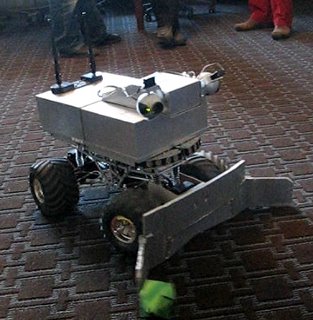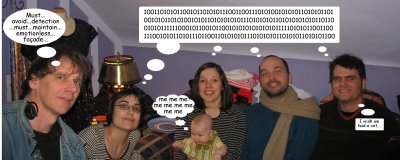
Ninety percent of the world's charismatic megafauna is gone. Hormone disrupters are turning the fish off Lakeshore into hermaphrodites, if the tumors don't get them first. The Arctic is heading for ice-free status by 2030, the Wilkins Ice Shelf is a measly six kilometers away from disintegration, air pollution in this miserable dick-ass excuse for a country alone helps kill 16,000 people a year. How do we rise to this challenge? How do we lie in this bed we have made?
Earth Hour. Sixty minutes during which we turn out the lights and pat ourselves on the back for saving the planet. Kings, Corporations, and Communities are all very much on board with this, naturally: in what other context could anyone pose so publicly while actually doing so little? Today's edition of my local
Toronto Star is creaming its jeans all over Earth Hour; they're giving it almost as much coverage as can be found in any three pages of the two thick sections they devote daily to selling automobiles. Hundreds, maybe thousands of Torontonians will celebrate the event by climbing into their SUVs and driving out to Downsview Park, there to light candles in the darkness. The Eaton's Center up at Yonge and Dundas is festooned with all sorts of big glossy posters trumpeting their whole-hearted love of Mother Earth. Why, I'll bet the reduced environmental impact from turning off those lights might even recoup a small fraction of the resources consumed to drive the massive multimedia extravaganza advertising Earth Hour.
Oh, wait. There isn't going to
be any reduction in environmental impact. Not unless the world's power-generating utilities decide to scale back the fossil fuels they're burning to reflect a one-time, one-hour tick in the time series.
Yes, I know. It's only supposed to make "a statement". It's supposed to be a symbol. And what does it symbolize, exactly? It symbolizes "hope" — which is to say, our infinite capacity for denial, our unwillingness to restrain ourselves in any meaningful sense, our brain-dead refusal to see the brick wall we're hurtling towards. It symbolizes the sick fucking joke that is the human race.
Back in the early nineties I had a girlfriend who volunteered for the Guelph branch of
OPIRG. Sick of the flood of smiley-faced books and schizoid puff pieces insisting that being green doesn't mean giving up your second SUV ("And now I sleep just fine at night, knowing that by serving one meat-free meal a week, I'm doing My Part to Save the Planet!"), she proposed countermeasures: a booklet entitled "Fifty Ways to Ease Your Conscience While Continuing to Destroy the Environment." I thought it was a brilliant idea. Everyone at OPIRG absolutely
hated it. Too cynical, they said. Too negative. It'll alienate more people than it converts. We must be cheerful. We must be positive.
Evidently this is a fairly common rule among environmental activists afraid of alienating the skittish: No Cynicism. (Which, these days, is tantamount to saying
No Cognition...) And so now, after more than a decade of putting on a happy face to keep from scaring the soccer moms, here we are: Earth Hour.
How far we've come.
There was never a time when things could be turned around with such petty gestures. You want to effect real change? You've got to address the root of the problem: human psychology. We evolved in the moment, we evolved to recognize imminent and proximate threats: pestilence, predators, an alpha male coming at us with murder in his eyes. The sight of a rotting corpse or a deformed child makes us squirm; the toothy smile of a great white freezes our blood. But we never evolved to internalize graphs and columns of statistics. They may
be real; they just don't
feel that way.
They're starting to now, though. Now, even here in the privileged and so-called "developed" world, we're starting to reap what we sow. The outbreaks break out ever-faster, the critters on our doorsteps die in record numbers. But even now, that's just
us— and we're not the ones calling the shots. The ones piloting the Titanic are way up in the bridge, isolated, unaffected, never more than a heartbeat from sparkling sands and clean water and the very best in medical care. It's still gonna be a while before the shit piles high enough to matter to
them. And so they'll do nothing, because for them the threat is not imminent; and if it is not imminent, neither is it real. So sayeth the Human gut.
So, you want to effect real change? You've got to make the threat matter to the ones who matter. You have to take the shit into their hallways until even
they can smell it. You have to threaten something valuable to
them, and threaten it
now, if you want to awaken that fierce innovative spark of self-preservation that burns brightest when the danger is in your face and the piss is running down your leg.
This is what you'd have to do: hunt down the Harpers and the Gordons and the Martins, the Roves and Cheneys, the Harrises and the Kleins and Bairds. (You might want to hunt down the Dubyas, too— they don't make any of the real decisions, but the symbolism is important.) Dig up the carcass of Dixie Lee Ray while you're at it, and throw its sorry rotten parts into the corral with her living soul mates. (For seasoning, you know.) Hunt down every pundit and commentator who, after years ridiculing the signposts, now shrugs and says
Oh, well, I guess we fucked up the planet after all. Too late to fix it now, let's just adapt and make sure that economic growth doesn't drop below five percent... Take every family member who sided with any of them (most have); explain to them all the proximate nature of threat-perception in the human animal, and that you're going to motivate them only way you can.
Then kill half of them. Give the other half a year to fix things. Hold back their families in, as the publishers say, "reasonable amounts against returns".
That's probably what it would take to get these people to give a shit.
Of course, you could never pull it off. All that security, all that well-founded fear of those being governed. And you know, even if the bridge crew
did suddenly get serious and try to turn things around, we're still in for a really rough ride. The trajectory of a planetary biosphere is not something you can change on a dime, especially not after the race downhill has been picking up speed for half a century. It's probably too late no matter what we do, unless Venter and Kurzweil turn out to be right.
Still, there's something to be said for simple accountability. And you might even find allies in some pretty unlikely places. Air pollution alone must kill more people in a month than all the serial killers anyone ever sent to the gas chamber; any death-penalty advocate capable of even rudimentary logic would pretty much have to get on board...
Anyway. Pondering such solutions will make
my Earth Hour go down a little easier, as I sit here in the dark. I hope it does the same for you.
Labels: In praise of biocide, just putting it out there..., rant






















